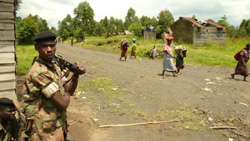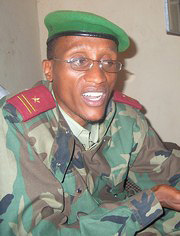 Photo: Nicholai Lidow/IRIN  |
| Soldiers loyal to dissident General Laurent Nkunda man a checkpoint |
Since the DRC government and various armed groups in the chronically unstable North Kivu province signed a ceasefire in January, the truce has been repeatedly violated and the number of displaced civilians in the province has increased.
The ceasefire was one of the highlights of an ?Act of Engagement? signed on 23 January in Goma, capital of North Kivu province, where some 847,000 people are displaced.
According to the UN mission in DRC, MONUC, by the end of April 2008 there had been ?a few hundred? violations of the terms of the ceasefire. Although all such incidents involved firearms, many were minor confrontations such as cattle theft.
The Act was signed by the DRC government, rebels led by renegade general Laurent Nkunda, and several dozen other armed groups of varying degrees of allegiance and hostility to the government in Kinshasa. The aim was to restore peace to both North and South Kivu, foster reconciliation between hostile groups and promote development in an area rich in natural resources.
Although there has been some progress in the provisions of the Goma deal, there has only been a reduction - rather than a halt - in fighting, while the humanitarian and human rights crisis in North Kivu has seen little or no improvement.
?The security situation has improved since the signing of the Act of Engagement,? said Caroline Draveny, head of information for North Kivu at the UN's Office for the Coordination of Humanitarian Affairs (OCHA). ?There have been far fewer clashes, and of a lesser intensity compared to November and December 2007,? she added.
 Photo: Nicholai Lidow/IRIN  |
| Women walking along the high mountain passes of Masisi Town, North Kivu |
Civilian displacement
More than half a million of North Kivu's internally displaced people (IDPs) have left their homes since the start of Nkunda's insurgency in December 2006.
Most of the latest clashes, in early May and late April, pitted government forces (FARDC) against the Forces Démocratique de la Libération du Rwanda (FDLR), a Hutu armed group of about 6,000, founded by fugitive perpetrators of Rwanda's genocide in 1994. The presence of the FDLR in eastern DRC has been a key element of the region's insecurity ever since. But because the FDLR is predominantly a Rwandan, rather than Congolese, group, it did not take part in the Goma conference.
Even more civilian displacement is likely in the coming weeks and months because FARDC is moving aggressively into areas held by the FDLR, which was allied to the government during the war that raged in DRC between 1997 and 2003, sucking in forces from more than half a dozen nearby states.
In November 2007, the DRC government made a fresh commitment to disarm the FDLR and send its fighters back to Rwanda, by force if necessary.
Following this agreement, signed with Rwanda in Nairobi, there has been ?fighting in the areas of Ngwenda and Kinandonyi, in the north of central Rutshuru district, since 21 April?, said Draveny.
Guerrilla war
Some analysts fear military moves alone against the FDLR are destined to fail.
?FARDC has no capacity to fight the FDLR successfully and even for a well-trained and equipped army it would be difficult to fight them since they are in the bush and fight a guerrilla war,? according to Henri Boshoff of the South African Institute for Security Studies.
 Photo: Arthur Asiimwe/IRIN  |
| Gen Laurent Nkunda |
He says the FDLR, which has flatly rejected the Nairobi deal and had no part in its drafting, would only go back to Rwanda if there were a chance it could take part in politics there.
?The two processes [Nairobi and Goma] should run concomitantly to achieve a better result,? said Anneke van Woudenberg, a researcher with Human Rights Watch.
Rwanda's role
Rwanda has a role to play here. Under the Nairobi Communiqué, it was supposed to give the DRC government a list of FDLR members it deemed to be ?genocidaires? who should be handed over for trial. But when the list was drawn up, it named 7,000 people. Given that DRC estimates that some 30 percent of the FDLR are Congolese nationals, the list is not likely to be taken seriously.
?Rwanda is raising the stakes and refusing to see the problem resolved,? Justin Bitakwira, a national deputy who played an active part in the Goma peace conference, told IRIN.
?Given the fragility of the government, unleashing a disarmament force against the FDLR would be very audacious because the system in place has not been up to dismantling the CNDP [Comité Nationale pour la Defence du Peuple, Nkunda's group], which is less structured than the FDLR. It is as if one did not know how to attack a rat but one dares to attack a cat,? added Bitakwira.
 Photo: Eddy Isango/IRIN  |
| IDPs in Mugunga I camp, near Goma, capital of North Kivu province |
Timetable agreed
Still, there have been advances in implementing the provisions of the Goma deal. Several follow-up committees comprising representatives of the various signatories have been set up. On 21 April a timetable was agreed for components of the Act, such as the return of IDPs, sensitisation of armed groups, and their disarmament ahead of their possible integration into the national army.
But progress, according to some participants, is slow. ?The return of refugees cannot be realised within 78 days as envisaged in the timetable and the entire pacification process will not have finished by this date, contrary to the schedule we adopted, because the army will not have visibly ended its operations against the FDLR,? said Kambasu Ngeve, head of the CNDP delegation.
The work of committee meetings has been hampered by power games and walkouts.
?It is a question of interests, and many armed groups see the posts in the follow-up committees as a slice of the cake, and they can no longer content themselves with sharing these posts,? added Ngeve.
?That is a pity because there are people who do not want peace in North Kivu and who are in favour of the Balkanisation of the country. Those who mine coltan and other minerals are playing at all levels to ensure this situation continues in confusion, allowing them the time to continue to do what they do,? lamented Sophie Bwiza, spokeswoman for the Patriotes résistants congolais (PARECO), a militia group formed to counter the threat from Nkunda.
Too little, too late
It was all too little, too late for 63 human rights NGOs that in late April collectively called on the United Nations and other sponsors of the Goma deal to push things forward and appoint a senior independent adviser on human rights for eastern DRC.
?Hundreds of thousands of victims clung to the hope that the peace deal would end their suffering. Sadly, no meaningful progress has been made on human rights commitments,? HRW's Van Woudenberg said in the statement.
For DRC President Joseph Kabila, it is too soon to judge the success of the peace process. ?By 30 June an evaluation will be made of what has been done after the Goma conference. It will be decided if we are on the right track ? or if it is necessary to move up a gear,? he told the Belgian newspaper Le Soir.
ei/cb/am/mw
Related articles
- • Tshisekedi Announces Government of National Unity and Calls for Unity Against M23 Rebels (February 23, 2025)
- • UN Security Council Calls on Rwanda to Stop Supporting M23 Rebels in DR Congo (February 22, 2025)
- • DR Congo Citizens Head to Polls to Elect President, Members of Parliament (December 20, 2023)
- • Felix Tshisekedi Sworn In as DR Congo President (January 24, 2019)
- • Constitutional Court Declares Tshisekedi Winner of Presidential Election (January 19, 2019)
- • Felix Tshisekedi Vows to Be the President of All Congolese (January 10, 2019)
- • Felix Tshisekedi Elected DR Congo President (January 10, 2019)
- • DR Congo Delays Results of December Election (January 6, 2019)
- • At least 30 dead after massacres in Ituri (March 2, 2018)
- • Botswana Urges Joseph Kabila to Step Down (February 26, 2018)
- • No elections in DR Congo in December without electronic voting machines: INEC (February 13, 2018)
- • US Warns DR Congo Against Electronic Voting for Delayed Election (February 12, 2018)
- • Felix Tshisekedi accuses INEC of illegally prolonging Kabila's mandate (October 24, 2017)
- • DRC Seeks Arrest of Presidential Candidate Moise Katumbi (May 19, 2016)
- • Papa Wemba Is Buried in Kinshasa (May 4, 2016)
- • Papa Wemba Awarded Highest National Honor as Thousands Pay Tribute (May 2, 2016)
- • Peacekeepers, Congo Army to Resume Joint Fight Against Rwandan Rebels (January 28, 2016)
- • Political tensions 'running high' in DR Congo ahead of 2016 elections (October 7, 2015)
- • Rights Groups: DR Congo Must Free Pro-democracy Activists (April 13, 2015)
- • DRC Army Putting Pressure on FDLR (April 1, 2015)
- • Police Open Fire on Crowd Protesting Election Law Change (January 19, 2015)
- • Etienne Tshisekedi Evacuated to Belgium for Medical Treatment (August 16, 2014)
- • Southern African Leaders to Meet in Zimbabwe (August 15, 2014)
- • Kerry Calls on Kabila to Honor Constitution (May 4, 2014)
- • Kerry in DR Congo for Security Talks (May 3, 2014)
- • Security Council extends UN mission, intervention force in DR Congo for one year (March 28, 2014)
- • DR Congo Takes Chairmanship of COMESA at Summit in Kinshasa (February 26, 2014)
- • Bosco Ntaganda Attacked Civilians on Ethnic Grounds, ICC Prosecutor Says (February 10, 2014)
- • New DR Congo amnesty law welcomed by UN envoys (February 5, 2014)
- • Colonel Mamadou Ndala Is Killed in Ambush (January 2, 2014)
Tags: |







